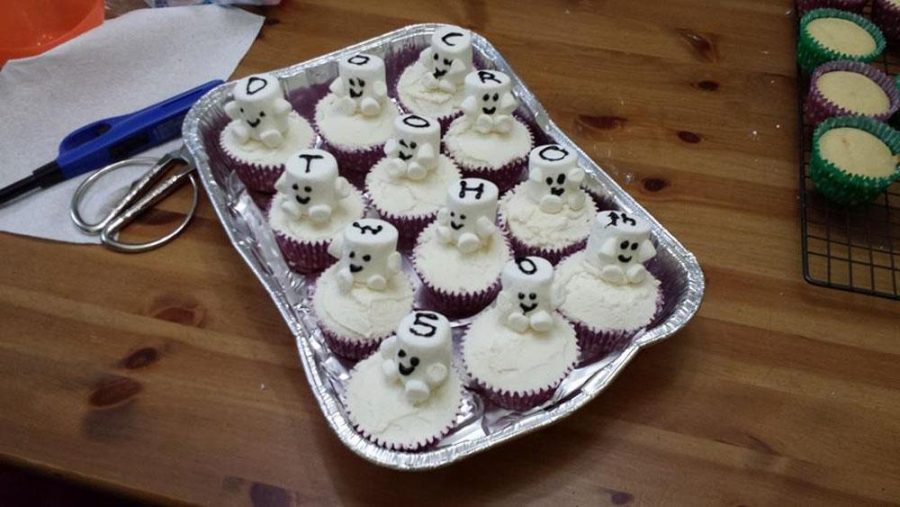Television shows help, not hurt
Clark students and staff explain the force behind the success of television shows.
Alfredo Degoma baked cupcakes for the fiftieth anniversary of Doctor Who
“It’s refreshing; it isn’t some cheesy romance or an action show,” said sophomore Mika Stanghill of the popular television show Sherlock. Stanghill is part of the giant crowd that keeps up with the British crime drama, which is even one of the top three television shows in China (the other two being House of Cards and Big Bang Theory). She was first drawn into the show when she saw Benedict Cumberbatch in Star Trek: Into Darkness and Martin Freeman in The Hobbit, actors who portray Sherlock and John, respectively, in Sherlock.
Stanghill’s appreciation for the show manifests itself in her attempts to get others to fall in love with the show, her purchases of the seasons, and her dedication through the long periods of waiting in between episodes. Despite having been on air for nearly four years, Sherlock only has nine episodes. “We have to have an imagination to stay sane,” she said.
Naturally, all the people who are frustrated with nonsensical reality television flock to more obscure, more thought-provoking shows. According to Flavorwire, many people turned to such shows in 2013 with the increase of streaming methods such as Netflix and Hulu.
Now, there are giant followings of these television shoes that even have their own names. Sherlock fans refer to themselves as “Sherlocked,” and fans of Doctor Who are called “Whovians.” Blogs, forums and threads created specifically for the television shows also foster an environment in which the fans of the shows can freely discover, ponder, argue and agree.
Junior Alfredo Degoma, a Whovian, first found out about Doctor Who through friends and Tumblr posts. “I like the way they tell their stories in a way so that most of the time things are confusing until the very end where they wrap everything up,” Degoma said. “I like the sci-fi aspects, how it’s about time travel and aliens.” Now, Degoma is a regular Doctor Who aficionado who follows all of the season’s episodes on Saturdays at 8:00 p.m. on BBCAmerica. He even owns Doctor Who keychains and T-shirts, and he made cupcakes for the fiftieth anniversary of Doctor Who.
However, teenagers are not the only ones who follow television shows with such dedication. History teacher Eric Kursinski is a fan of post-apocalyptic zombie show The Walking Dead. He started watching the series on Halloween of 2010 when his friends who read the comic books which the show is based on recommended it to him. He was also interested because he is a fan of Frank Darabont, the shows developer and producer.
Kursinski is fascinated by the show because he wonders what would happen in real life if there wa no structure, as in the show. “The show makes you think about the tough decisions you have to make in such a setting,” Kursinski said. “For example, in one episode, Rick, the main character, couldn’t determine whether or not the person coming towards him was human. So he had to think about whether or not to kill the person.”
“I watch the show with my friend and her husband,” Kursinski said. “We normally discuss the episode prior to watching it and afterwards as well. We also have this game in which we look at a location and analyze it to see how safe it would be in a zombie apocalypse.”
Degoma can instantly find fellow fans by their inside phrases and jokes. “We say things like, ‘Allons-y,’ ‘Geronimo,’ and ‘Don’t blink,’ which are all phrases from Doctor Who,” Degoma said.
The Sherlocked fandom has its own insiders and quirky characteristics. “Sherlock is notorious for being extremely lazy,” Stanghill said. “At some points, he is too lazy to get his own phone from his pocket, and makes John do so. So, in my group of friends, when we are too lazy to grab something, we sometimes say, ‘BUT JOHN.’”
But such thought-provoking television shows are still in the tender stages. Many people have heard about the shows, but they have not watched them yet. “Because not everyone knows what Doctor Who is about, it is a pleasant surprise to find a real Whovian in a crowd,” Degoma said. “It almost feels like an underground club.”
However, intellectual television shows are garnering more attention; the figures do not lie. The New York Times recently reported that a 30-second advertisement during the finale of American crime drama Breaking Bad cost $500,000. This exorbitant amount of money indicates the rising popularity of intellectual television shows.
Yet the shows do not falter in their quality. Too often shows lose their original meaning and the first wave of fans desert the shows because they are desensitized. But this is not true of the current group of television shows. “Today’s episodes of Doctor Who still have the same appeal as the ones from fifty years ago,” Degoma said.

INTERESTS/HOBBIES: Concert-going, book-reading, pun-saying, cover-making, prose-writing
EXTRACURRICULAR ACTIVITIES: GMG Regional Board (VP of...













